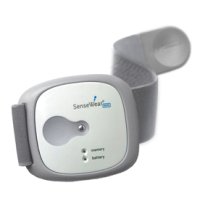Armband has long been promoted for use in weight control programs
April 21, 2009
USC researchers are testing a high-tech armband that may help Type 2 diabetics make lifestyle changes and bring their disease under control.

Armband from SenseWear, to help
researchers understand the impact of diet
and
activity in persons with Type 2 diabetes.
Twenty-five Type 2 diabetics are being recruited for a six-month study using the SenseWear armband coupled with diet and exercise counseling, said Dr. Rebecca Meriwether, an associate professor in the USC School of Medicine.
Meriwether, a physician and epidemiologist, is principal investigator of the study. Co-investigators include Dr. Sara Wilcox, Dr. Gregory Hand and Dr. Steven Blair, all from the Arnold School’s Department of Exercise Science.
“We’re exploring how to use the armband to help diabetics understand the impact of different activities and diet on their blood sugars,” Meriwether explained.
The study – titled “Automated Feedback for Effective Control of Type 2 Diabetes -- is supported by the armband’s manufacturer, BodyMedia Inc, a Pittsburg, Pa. company that has long promoted the device for use in weight loss programs.
Meriwether said that weight control is not a specific target of the AFFECT-Diabetes study, but it could be a goal selected by some participants.
Five subjects have already signed up for the study and 20 more are being sought. The study is open to men and women 18-64 with poorly controlled Type 2 diabetes with hemoglobin A1c readings in the 7.5 to 10 range.
Participants treated with oral medicines and long-acting insulin, such as Lantus (insulin glargine) and Levemir (insulin detemir) are eligible, Diabetics treated with other types of insulin will not, however be eligible to participate. People with serious uncontrolled medical problems that may interfere with full participation in the study or increase participants’ risks are not eligible to participate.
Additionally they must have a computer with an internet connection and not currently be involved in a formal diet or exercise program.
Early on, the study can involve some work on behalf of the participants, Meriwether admits candidly. But she says the experience will help each individual understand how their own body responds to what they eat and the amount and type of physical activity they get.
Meriwether said the SenseWear is worn around the upper arm just like an mp3 player. Sensors in the armband measure the wearer’s movement, skin temperature, temperature change, and sweat production and is sensitive enough to tell if the wearer is asleep or lying down but awake.
Algorithms programmed into the device translate the measurements into minutes of physical activity and calories burned, visible on a wearable monitor about the size of a watch face, so they can keep track of how they are doing during each day.
Participants also upload the armband data, including physical activity minutes and calories burned to the website each day using a USB cable connected from the armband to their computers.
Besides wearing the armband, study participants are required to log onto a website each day and enter information about the food they eat which the site converts to calories consumed and also displays information about grams of carbohydrates, fats and proteins eaten to help diabetics keep track of how well they are doing in balancing their carbs and lowering their fat intake.
The website can then allow participants to compare calories burned with calories consumed and see the impact each has on the other. Each participant will also be expected to check their fasting blood sugar and at least one other blood sugar each day, log this information and email or fax it to the AFFECT-Diabetes coach prior to each counseling call.
The AFFECT-Diabetes coach will help each participant one-on-one over the telephone understand the information from the armband and website and set goals for improving their diet and physical activity to improve their blood sugars and troubleshoot problems they may have with the armband or website.
The AFFECT-Diabetes study does not replace medical care for participants. Participants are expected to see their physician as usual and continue their medications unless their doctor makes changes.
“With this study we hope to find out if people like the program, if they are willing to do it, and how much help they will need from counselors,” Meriwether said.
To find out if you may be eligible call 803-777-2749.



_01.jpg)
_02.jpg)